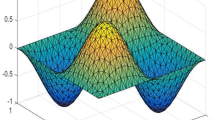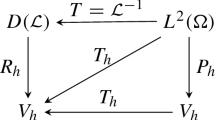Abstract
In this paper, a mixed finite element method is applied in spatial directions while keeping time variable continuous to a class of time-fractional diffusion problems with time-dependent coefficients on a bounded convex polygonal domain. Based on an energy argument combined with a repeated application of an integral operator, optimal error estimates, which are optimal with respect to both approximation properties and regularity results, are derived for the semidiscrete problem with smooth as well as nonsmooth initial data. Specially, a priori error bounds for both primary and secondary variables in \(L^2\)-norm are established. Since the comparison between Fortin projection and the mixed Galerkin approximation of the secondary variable yields an improved rate of convergence, therefore, as a by-product, we derive \(L^p\)-estimates for the error in primary variable. Finally, some numerical experiments are conducted to confirm our theoretical findings.
Similar content being viewed by others
References
Bramble, J.H., Schatz, A.H., Thomée, V., Wahlbin, L.B.: Some convergence estimates for semidiscrete Galerkin type approximations for parabolic equations. SIAM J. Numer. Anal. 14, 218–241 (1977)
Brezzi, F., Fortin, M.: Mixed and Hybrid Finite Element Methods, 2nd edn. Springer, New York (1991)
Chen, H., Ewing, R., Lazarov, R.: Superconvergence of mixed finite element methods for for parabolic problems with nonsmooth initial data. Numer. Math. 78, 495–521 (1998)
Fujita, H., Suzuki, T.: Evolution problems. Handbook of Numerical Analysis, vol. II, pp. 789–928. North Holland, Amsterdam (1991)
Gorenflo, R., Mainardi, F., Moretti, D., Paradisi, P.: Time fractional diffusion: a discrete random walk approach. Nonlinear Dyn. 29, 129–143 (2002)
Goswami, D., Pani, A.K.: An alternate approach to optimal L2-error analysis of semidiscrete Galerkin methods for linear parabolic problems with nonsmooth initial data. Numer. Funct. Anal. Optim. 32, 946–982 (2011)
Goswami, D., Pani, A.K., Yadav, S.: Optimal error estimates of two mixed finite element methods for parabolic integro-differential equations with nonsmooth initial data. J. Sci. Comput. 56, 131–164 (2013)
Goswami, D., Pani, A.K., Yadav, S.: Optimal \(L^2\) estimates for semidiscrete Galerkin methods for parabolic integro-differential equations with nonsmooth data. ANZIAM J. 55, 245–266 (2014)
Huang, M., Thomée, V.: Some convergence estimates for semidiscrete Galerkin type schemes for time-dependent non-selfadjoint equations. Math. Comput. 37, 327–346 (1981)
Jin, B., Lazarov, R., Zhou, Z.: Error estimates for a semidiscrete finite element method for fractional order parabolic equations. SIAM J. Numer. Anal. 51, 445–466 (2013)
Jin, B., Lazarov, R., Pascal, J., Zhou, Z.: Error analysis of semidiscrete finite element methods for inhomogeneous time-fractional diffusion. IMA J. Numer. Anal. 35, 561–582 (2015)
Jin, B., Lazarov, R., Zhou, Z.: The Galerkin finite element method for a multi-term time-fractional diffusion equation. J. Comput. Phys. 281, 825–843 (2015)
Jin, B., Li, B., Zhou, Z.: Subdiffusion with a time dependent coefficient: analysis and numerical solution. Math. Comput. 88, 2157–2186 (2019)
Johnson, C., Thomée, V.: Error estimates for some mixed finite element methods for parabolic type problems. RAIRO Anal. Numér. 14, 41–78 (1981)
Karaa, S.: Semidiscrete finite element analysis time fractional parabolic problems: a unified approach. SIAM J. Numer. 56, 1673–1692 (2018)
Karaa, S., Mustapha, K., Pani, A.K.: Finite volume element method for two-dimensional fractional sub-diffusion problems. IMA J. Numer. Anal. 37, 945–964 (2017)
Karaa, S., Mustapha, K., Pani, A.K.: Optimal error analysis of a FEM for fractional diffusion problems by energy arguments. J. Sci. Comput. 74, 519–535 (2018)
Karaa, S., Pani, A.K.: Error analysis of a FVEM for fractional order evolution equations with nonsmooth initial data. ESAIM Math. Model. Numer. Anal. 52(2), 773–801 (2018)
Kilbas, A.A., Srivastava, H.M., Trujillo, J.J.: Theory and Applications of Fractional Differential Equations. Elsevier, Amsterdam (2006)
Le, K.N., McLean, W., Mustapha, K.: Numerical solution of the time-fractional Fokker–Planck equation with general forcing. SIAM J. Numer. Anal. 54, 1763–1784 (2016)
Luskin, M., Rannacher, R.: On the smoothing property of the Galerkin method for parabolic equations. SIAM J. Numer. Anal. 19, 93–113 (1982)
Mclean, W.: Regularity of solutions to a time-fractional diffusion equation. ANZIAM J. 52, 123–138 (2010)
Montroll, E.W., Weiss, G.H.: Random walks on lattices. II. J. Math. Phys. 6, 167–181 (1965)
Mustapha, K.: FEM for time-fractional diffusion equations, novel optimal error analyses. Math. Comput. 87, 2259–2272 (2018)
Mustapha, K., Schötzau, D.: Well-posedness of \(hp-\)version discontinuous Galerkin methods for fractional diffusion wave equations. IMA J. Numer. Anal. 34, 1226–1246 (2014)
Raviart, P., Thomas, J.A.: Mixed finite element method for second order elliptic problems. In: Mathematical Aspects of the Finite Element Method. In: Galligani, I., Magenes, E. (eds). Lecture Notes in Mathematics, vol. 606. Springer, Berlin (1977)
Sakamoto, K., Yamamoto, M.: Initial value/boundary value problems for fractional diffusion-wave equations and applications to some inverse problems. J. Math. Anal. Appl. 382, 426–447 (2011)
Thomée, V.: Galerkin Finite Element Methods for Parabolic Problems. Springer, Berlin (1997)
Zhao, Y., Chen, P., Bu, W., Liu, X., Tang, Y.: Two mixed finite element methods for time-fractional diffusion equations. J. Sci. Comput. 70, 407–428 (2017)
Acknowledgements
This research is supported by the Research Council of Oman grant ORG/CBS/15/001. The second author acknowledges the support from Institute Chair Professor’s fund and the support from SERB, Govt. India via MATRIX Grant No. MTR/201S/000309. Both the authors thank the referees for their valuable suggestions which help to improve the manuscript.
Author information
Authors and Affiliations
Corresponding author
Additional information
Publisher's Note
Springer Nature remains neutral with regard to jurisdictional claims in published maps and institutional affiliations.
Rights and permissions
About this article
Cite this article
Karaa, S., Pani, A.K. Mixed FEM for Time-Fractional Diffusion Problems with Time-Dependent Coefficients. J Sci Comput 83, 51 (2020). https://doi.org/10.1007/s10915-020-01236-7
Received:
Revised:
Accepted:
Published:
DOI: https://doi.org/10.1007/s10915-020-01236-7
Keywords
- Time-fractional diffusion equation
- Time-dependent coefficients
- Mixed finite element method
- Semidiscrete method
- Optimal error estimates
- Smooth and nonsmooth initial data




